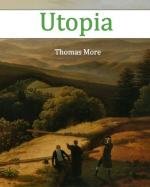|
This section contains 5,208 words (approx. 18 pages at 300 words per page) |

|
SOURCE: "Humanist Spirituality and Ecclesial Reaction: Thomas More's Monstra," in Church History, Vol. 56, No. 1, March, 1987, pp. 25-38.
In the following essay, Kaufman takes issue with the traditional reading of Utopia as a direct embodiment of humanist ideals, calling it instead "a gentle ecclesial remonstrance " to the principles of More's humanist colleagues.
"Do you want to see new marvels (monstra)? Do want to seestrange ways of life, to find the sources of virtue or the causes of all evil; to sense the vast emptiness that commonly goes unnoticed?"
Cornelius Grapheus was responsible for this sales promotion. Along with other prefatory material, it introduced Thomas More's Utopia to readers in 1516. More's friend, Erasmus of Rotterdam, had collected endorsement, and either he or Peter Giles had approached Grapheus, then secretary to the municipal government at Antwerp. It is reasonable to assume that Grapheus jumped at the chance to associate his name...
|
This section contains 5,208 words (approx. 18 pages at 300 words per page) |

|


